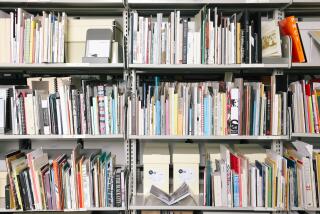A ghastly past, an exalted life
While imprisoned in Dachau in 1938, Herbert Zipper spent 12 mind-numbing hours a day pushing a cart loaded with heavy stones. To buoy his spirits and those of other inmates, the Viennese intellectual composed a militant anti-Nazi anthem and secretly conducted a small orchestra in an unused latrine.
Even amid the soul-depleting humiliation and misery of the notorious German concentration camp, he realized that music could bring life-affirming joy.
After surviving Dachau and then Buchenwald, Zipper dedicated his life to the arts, teaching at USC and the New School for Social Research in New York and creating symphonic music programs for younger students in rural and inner-city schools. Practically until his death 10 years ago at age 92, he was mentoring students in China and teaching composition and music theory at the private Crossroads School in Santa Monica.
“We have to see the world as it is, but we have to think about what the world could be,” Zipper told a Times reporter shortly before he died. “That’s what the arts are about.”
On Sunday afternoon Crossroads will honor the impassioned teacher whom students called “Papa Z” when it unveils the Herbert Zipper Archive, a remarkable compilation of books, hand-penned music scores, recordings, photographs and letters, including one that Zipper wrote in German to his friend Eric Simon on Buchenwald Konzentrationslager letterhead. The collection -- which also features material about Zipper’s wife, dancer Trudl Dubsky, who died in 1976 -- was donated to the school after Zipper’s death.
The opening of the exhibition, which is titled “Herbert Zipper: Courage Teacher,” will feature a live performance of “Dachau Lied” (Dachau Song), for which his friend and fellow prisoner Jura Soyfer wrote the lyrics. Not long after, Soyfer died at Buchenwald. Throughout the war, inmates memorized the song of resistance and passed it from camp to camp.
The original score, neatly handwritten by Zipper sometime later, is in the collection, but with the title “Arbeit Macht Frei.” The cruelly cynical words, which translate roughly as “Work will set you free,” greeted Jewish prisoners when they arrived at the Dachau entry gate. The song, which can be heard at www.ushmm.org/museum/exhibit/online/music/detail.phpcontentdachau, exhorts prisoners:
Stay humane, Dachau mate,
Be a man, Dachau mate,
And work as hard as you can, Dachau mate,
For work leads to freedom alone!
As a young man, Zipper refused to be defeated by hatred or unspeakable conditions, says Crossroads co-founder Paul Cummins, who met Zipper through his wife, Mary Ann, and went on to become the musician’s biographer. That positive outlook served Zipper well throughout his long life and stirred optimism in others, Cummins says.
In his book “Dachau Song: The Twentieth-Century Odyssey of Herbert Zipper,” Cummins offers proof of Zipper’s resilience and inventiveness. While in Dachau, he persuaded a sympathetic SS guard to find him violin string. He and his fellow prisoners then carved crude instruments from hoarded wood and performed for small groups of inmates in a vacant latrine as others stood watch.
“Dr. Zipper’s life is a vibrant example of somebody who used the arts literally as a lifeline for himself and his community,” says Roger Weaver, Crossroads’ headmaster.
Distilling the collection for visitors will be 6-foot-tall panels on display in the first-floor lobby of the school’s Paul Cummins Library. The panels trace Zipper’s remarkable life and career: his carefree prewar days in Vienna, where as part of a well-to-do family he studied music with Maurice Ravel and Richard Strauss; his time in the camps; his wartime work in Manila, where he served in the underground and radioed the movements of the Japanese to Gen. Douglas MacArthur; and his long postwar career as a teacher and conductor in New York, Chicago and Los Angeles. Zipper, who lived in Pacific Palisades, was instrumental in the creation of the Colburn School of Performing Arts in downtown Los Angeles.
The school’s Zipper Hall is named for him.
Weaver says Crossroads plans to make the materials available to scholars and students.
Thanks to outside consultants who helped create digital copies of the items, many of them quite fragile, it expects also to offer access to the documents and photos over the Web, says Aquita Winslow-Tyler, Crossroads’ director of learning resources.
The collection is an unusual asset for the school, which prides itself on putting the arts “on the same shelf as academics” as a necessary element of preparing students for college and life, Weaver says.
“We have these treasures and obviously need to preserve them,” says David Martino, Crossroads’ archivist, who has immersed himself in the collection for the last two years. “But we also have the responsibility to share it.”
Zipper’s oft-stated goal was “to be a good ancestor.” Having prevailed against the evils of fascism, he managed throughout his life to live the dictates of Soyfer’s lyrics: “Stay humane, Dachau mate. Be a man, Dachau mate.”
*
*
‘Herbert Zipper: Courage Teacher’
What: Official opening
Where: Herbert Zipper Room, Paul Cummins Library, Crossroads School, 1714 21st St., Santa Monica
When: 2 to 5 p.m. Sunday
Admission: Free
Contact: www.xrds.org/pubevents/zipper.htm
More to Read
The biggest entertainment stories
Get our big stories about Hollywood, film, television, music, arts, culture and more right in your inbox as soon as they publish.
You may occasionally receive promotional content from the Los Angeles Times.











